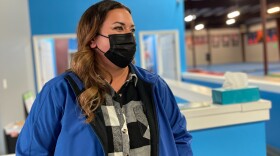While the community may be on the other side of the omicron surge, it's still important for people to get vaccinated and boosted to be prepared for whatever comes next, Austin Public Health leaders said Friday.
Dr. Desmar Walkes, Austin-Travis County's health authority, said the surge “devastated” the community with more infections in vulnerable populations, children and older people. In the last two weeks, 66 people with the disease died in Travis County.
“Omicron may have caused milder illness in a lot of people, but it ran through our community like wildfire,” Walkes said at a news conference. “It got to those vulnerable people — those people with high blood pressure, diabetes, lung disease or cancer — quickly. And it got to those who are unvaccinated quickly.”
While the community may be approaching herd immunity, Walkes said, people who have been vaccinated still need to get boosted. About 72% of those 5 and older who are eligible to receive a shot have been vaccinated, but only about 30% have received a booster. Booster shots are recommended five months after a Pfizer or Moderna mRNA vaccine and two months after the Johnson & Johnson vaccine.
Cassandra DeLeon, APH chief administrative officer for the Disease Prevention and Health Promotion Division, said keeping up to date on vaccines is important to prevent outbreaks, surges and overwhelming the hospital system with COVID cases.
“At the end of the day, it helps protect those vulnerable high-risk populations and those populations who cannot get vaccinated because they’re not recommended yet — like our very young … or those populations who may not be able to get vaccinated for a myriad of different reasons,” DeLeon said.
She also said children aged 5 to 11 as a group were undervaccinated — with only 32% fully vaccinated. DeLeon said APH is working with doctors to help provide parents with information regarding the risks and benefits of getting vaccinated.
APH Chief Epidemiologist Janet Pichette said the department is working on updating its COVID-19 dashboard to align with other agencies and provide information to better inform the community. New cases looked like they spiked earlier this month due to a backlog of data that was entered through an automated system.
Walkes said APH could shift to Stage 4 of the health department’s risk-based guidelines in 10 days, but it would depend on more people getting vaccinated and masking while in indoor public spaces.












